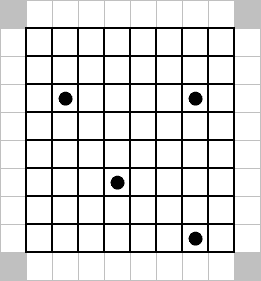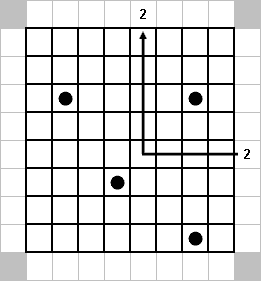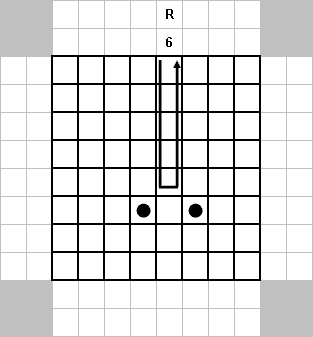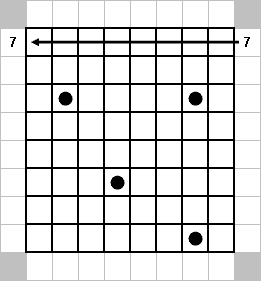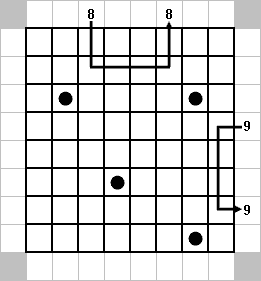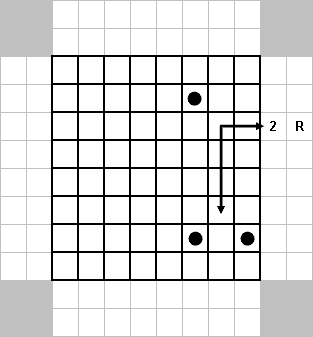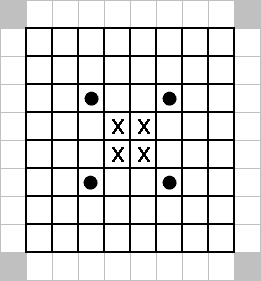Black Box (game)
|
|
Black Box is a game of "hide and seek" for one or two players, which simulates shooting rays into a black box to deduce the locations of balls hidden inside. It was created by Eric Solomon. It was marketed as a Parker Brothers board game in the late 1970s, and there are also numerous computer implementations for many different platforms, including one which can be run from the Emacs text editor.
| Contents |
Object of the Game
Black Box is played on a two-dimensional grid. The object of the game is to discover the location of objects ("balls") hidden within the grid, by the use of the minimum number of probes ("rays"). The balls are hidden by a person in a two-player game. In a solitaire game, they are either hidden by a computer or they are pre-hidden; in this case, the results of various probes are resolved by looking them up in a book. The seeker designates where the ray enters the black box and the caller (or computer or book) announces the result.
Rules
The most common configuration for novice players is four balls in an 8-by-8 grid. Below is a sample black box in this configuration.
There are 32 input positions in an 8-by-8 grid, eight each at the top, bottom, right, and left. A beam is "fired" into one of these positions and the result is used to help deduce the location of a known number of hidden balls.
Balls interact with rays in three ways. A direct impact on a ball by a ray is a "hit". Thus, ray 1 fired into the box configuration below strikes a ball direcly, generating a "hit", designated by an "H". A ray which hits a ball does not emerge from the box.
Missing image
BlackBoxSample2.png
Image:BlackBoxSample2.png
The interaction resulting from a ray which does not actually hit a ball, but which passes directly to one side of the ball is called a "deflection". The angle of deflection for this ray/ball interaction is 90 degrees. Ray 2 is deflected by the ball below, exiting the box as shown.
The final type of interaction of a ray with a ball is a "reflection", designated by an "R". This occurs in two circumstances. If a ball is at the edge of the grid, any ray which is aimed into the grid directly beside it causes a reflection.
Rays 3 and 4 below would each generate a reflection, due to the ball at the edge. Ray 5 would be a hit on the ball.
Missing image
BlackBoxSample4.png
Image:BlackBoxSample4.png
The other circumstance leading to a reflection is when two deflections cancel out. In the grid below, ray 6 results in a reflection due to its interaction with the balls in the grid.
There are also misses, ray 7 below, for instance, interacts with no balls in the grid.
Rays that don't result in hits or reflections are called "detours". These may be single or multiple deflections, or misses. A detour has an entry and an exit location, while hits and reflections only have an entry location for a hit, and a single entry/exit location for a reflection.
Of course, more complex situations result when these behaviors interact. Ray 8 results in two deflections, as does ray 9.
Some rays travel a twisted course, like ray 1 below.
Missing image
BlackBoxSample8.png
Image:BlackBoxSample8.png
Notice that this complex set of five deflections looks exactly like a single deflection, as shown by ray 2 below. Things are not always as simple as they seem within a black box.
Missing image
BlackBoxSample9.png
Image:BlackBoxSample9.png
Reflections and hits can be more complex, too. Ray 2 gets deflected by the first ball, reflected by the next two balls and again deflected by the original ball, yielding a reflection.
Ray 3 below gets deflected by the first ball, then by the second ball, and then hits the third ball, yielding a hit.
Missing image
BlackBoxSample11.png
Image:BlackBoxSample11.png
The complete set of interactions of rays with the original sample black box is shown below. Note that for detours, the input and output locations are interchangeable - it does not matter if ray 2 below enters the box from the left side, or the top.
Missing image
BlackBoxSample12.png
Image:BlackBoxSample12.png
Scoring
Each entry and exit location counts as a point. Hits and reflections therefore cost one point, while detours cost two points. When the seeker guesses the location of the balls in the grid, each mis-identified ball position costs five penalty points.
Different ball positions lead to different average scores - a very easy four-ball game might average eight or nine points to solve, while a very hard game might average 18 points.
Variants
The most common variant of Black Box is played on an 8-by-8 grid with five (or more) balls. Five-ball configurations allows for positions that cannot be unambiguously determined by probes. The following grid shows an example of this.
If the fifth ball is in any of the four positions marked by the X, no ray can ever determine where it is located, because it is shielded from all directions by the surrounding balls. The addition of more balls allows for more complex indeterminate configurations, but also allows for more intriguing interactions.
Black Box can also be played with different-sized grids, such as 10-by-10 or 12-by-12 grids.
A related class of computer puzzle games feature different types of obstacles concealed in the box, which affect rays in varying ways — such as mirrors which reflect only a direct-hit ray, or prisms which split one ray into two. The GNOME game GFingerPoken (http://gfpoken.bigw.org/) and one section of the Macintosh game System's Twilight fall into this class.
References
- Black Box: Rules and Solitaire Games (instruction manual), Parker Brothers, 1978
- F. Thomas May, blackbox.el - Lisp source code for GNU Emacs implementation of blackbox, 1985

